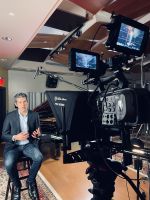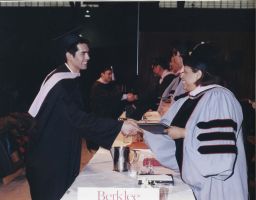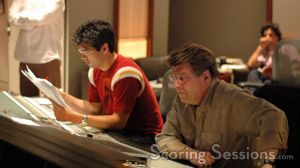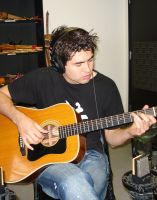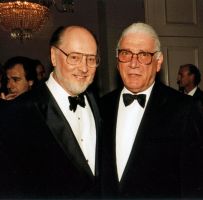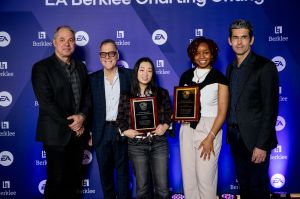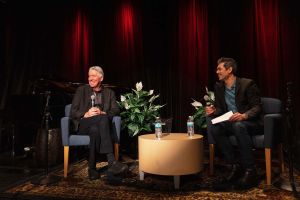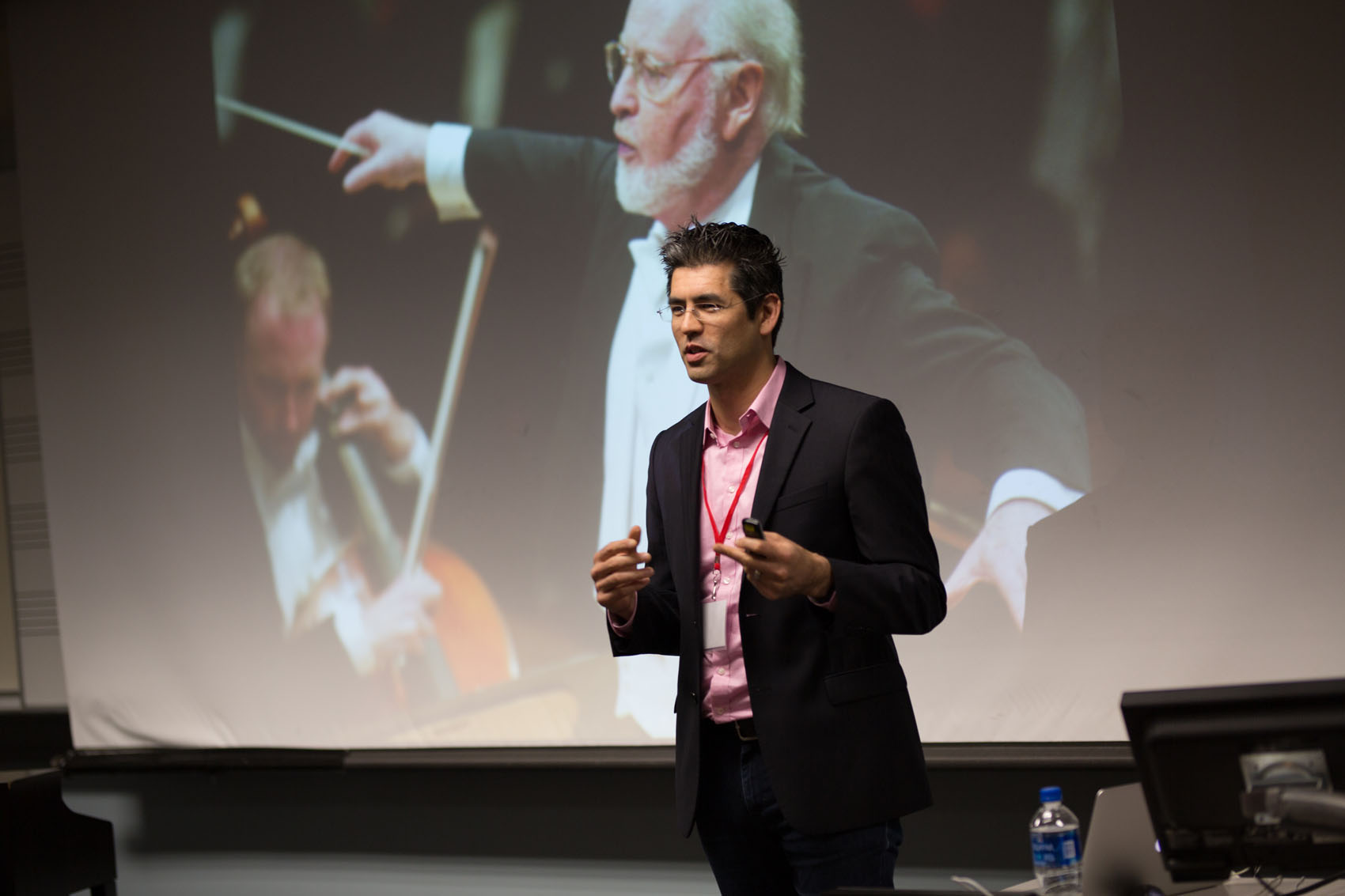
From Stage to Screen: An interview with Sean McMahon, Chair of Screen Scoring at Berklee
For some, their first introduction to Berklee College of Music was and advertisement in Downbeat Magazine for a Film Scoring Correspondence course. Today Berklee's newly renamed Screen Scoring department is one of the best in the world. Notable Berklee film scoring alumni include giants like Howard Shore, Alan Silvestri, and Alf Clausen, as well as up and coming like Pinar Toprak And not only film composers, but music editors and supervisors, arrangers and orchestrator like Alan Broadbent and Rob Mounsey.
Sean McMahon is the Chair of the Screen Scoring Department at Berklee. He has a unique perspective having been a graduate from Berklee and worked his way up the ladder as a professional, which is not an easy thing to do. He was kind enough to speak with us.
In 2023 Berklee renamed the Film Scoring department that you chair. Please tell us about that...
I launched a new Bachelor’s program in Video Game Scoring which is called Game and Interactive Media Scoring, or GAIMS for short. But Film Scoring was the name of the existing degree program and also the name of the department. It just didn’t seem right that a Video Game Scoring major could live within “Film Scoring.” “Screen Scoring,” however, is a more commonly used term internationally and more accurately captures what we do. Movies and TV are seen on a screen. Video games are also on a screen. So, the new name is Screen Scoring which we feel is more appropriate. Within the Screen Scoring department, we now have two degree programs—one is called
Film & Media Scoring and the other is called Game & Interactive Media Scoring.
How are those two disciplines different from a composer’s point of view?
The main difference between film scoring and video game scoring is that one is a completely linear medium, being film, and video game scoring is non-linear medium. You can watch the original Star Wars movie 100 times in a row, and the music will play exactly the same way every time. But video game music is interactive and needs to respond to what the player does—which is unpredictable. Is the player going to move left, move right, jump up, pull the trigger, etc.? The music must adapt. And I think what’s really cool about video game music is that the music is often never played exactly the same way twice.
The technical approach to video game scoring is much different because the composer is not scoring footage like you would in TV or film. Rather, the composer is writing to images, a description of the level, or some game capture footage to get a rough idea of the player experience. As a result, it can be much more freeing and liberating to compose without the constraints of scoring a scene for film or TV.
Video game music is also different than film in that it frequently must loop seamlessly. And to achieve that, you let the reverb tail ring out. Then you record just the isolated reverb tail and paste that recording onto the head of the track. And that’s how you produce a seamless loop. There are some other techniques like vertical remixing (or vertical layering), where you’ve got a couple of different ways the game engine is able to respond to the choices of the player. So, imagine you’re going to go into battle with a big, huge Lord of the Rings-style army. But first you choose your armor, your sword, shield, and then you get on your horse and head into battle. One way the video game can handle this situation is you have two versions of the same piece of music. One is an ambient or a light version, and the other is a more aggressive one. So the light version plays while you’re choosing your armor, and now you get on your horse and ride into battle. And what the game engine does is it introduces a crossfade into the aggressive version of the track as you approach the enemy, so it sounds more like battle music. And the player doesn’t consciously notice this because it’s so seamless. The tempos and harmony would be the same in both the ambient and aggressive tracks, but the arrangement and orchestration could be different. You could save the brass and drums for the aggressive version of it, and the ambient version might just be strings and woodwinds, for example.
But the thing that both mediums, film and video games, have in common is that the music must serve the story. The story always comes first and that means that job one for the composer is to emotionally serve and support the narrative. If you’re a performing artist like a singer-songwriter for example, it’s all about you. But when it comes to film, TV, or video games, it’s all about the story. And not at all about the composer. So the story is always the priority.
Let’s talk about your background. When and how did you know you wanted to be a musician and a composer?
When I was leaving high school and needed to figure out what I was going to do for college, I knew that whatever I was going to do, it had to include music in some way. I really didn’t want to do anything else and spent so much time on music as a teenager, I didn’t even know if I was good at anything else. I felt like I didn’t have any other options other than music. I supposed that if I were really passionate about being a dentist or something like that, and felt I would be good at it, I would have chosen dentistry. But I didn’t because so much of my identity was so wrapped up in being a musician.
My parents started me on the violin at the age of four, and when I turned twelve, I said; “Mom and Dad, I want to rock! Can you buy me an electric guitar?” So, my parents bought me my first guitar and I became obsessed with bands like Led Zeppelin, Def Leppard, AC/DC, Iron Maiden, and so on. All I wanted to do back then was to write and perform songs on the guitar with my friends. I had a band; we were playing in clubs in Toronto when we were 14. And then we got to the end of the trail in high school and I was very lucky to get accepted to Berklee. It was—and still is—such a unique place to learn. In Canada, where I grew up, there were only traditional conservatory-style institutions. Classical music (at that time in my life—but not anymore!) was like a form of math to me. And math was not what I wanted to do at all, so I was really lucky to go to Berklee. If I didn’t go to Berklee, I don’t know what I would be doing today!
When I got to Berklee I wanted to pursue rock and pop music. In other words, I wanted to become a rock star! I wanted to be the next Steve Vai. But—and I’m sure I’m not the only one who has experienced this—when I was in high school, everyone thought of me as the music person. But then when you get to a place like Berklee, everyone’s the music person and I was suddenly feeling just kind of average. Some of my fellow students would brag, “Ten hours straight in the practice room without a bathroom break!” I realized that sort of life and practice regimen was not for me. If that was the price of success, I didn’t want to pay it. So I was unsure of how I was going to make a living as a performer. But one of my friends had said, “Hey, I’m taking this class called Intro to Film Scoring. Why don’t you take it with me.”
I took that course and was like, yeah, I could totally see myself doing this, and it’s practical (meaning I thought I could find work as a film composer). I was quite naïve, I must admit. But, if you really want practical, you should become an accountant or a dentist. People will still need dentists in fifty years. For me though, film scoring wasn’t as abstract as pop music. I could imagine a career path for myself because I knew there was a movie industry out in Hollywood and each movie needed a score. So that’s what put me on the path to film music and I ended up going to the USC Thornton School for Film Scoring. USC took me to LA, and once I was in LA, I managed to get shoehorned into the industry.
When you say “shoehorned”, I don’t think that’s quite as easy as just shoehorning. There’s a lot of industry in LA, but there’s also a lot of competition.
Oh, yes, and I think there’s no right way and no wrong way to approach launching a career in scoring because nobody has the same story. No one fails or succeeds in just the same way. And what I tell students is to give themselves a chance to get lucky. You need to find and create ways that give you as much exposure to industry decision-makers as possible.
And I got lucky myself. When I went to USC, many of the teachers weren’t really composing professionally anymore. But there were a few that were, and one of them was a composer named Christopher (Chris) Young. Chris still teaches on the USC faculty today. His wheelhouse is writing for orchestra and he’s sort of an old school, Hollywood guy. So, one of his assignments was to write for a 70-piece orchestra that would be recorded with the USC student orchestra on the Paramount scoring stage called “Stage M”, which sadly no longer exists today. Chris was scoring a movie at the time and very busy. But he managed to attend the recording session for a short while. Luckily, I was one of those students he got to observe recording and he saw that I could write for orchestra well.
When the school year ended, Chris would offer to meet one-on-one with students, but there was a waiting list. A few months after I graduated in 2004, I got a phone call from his assistant saying, “Hey, Chris has an opening this afternoon. Are you interested in meeting with him?” I met with him, and he listened to my demo and gave me advice. A week later I got a call from his assistant saying, “Hey, Chris needs some help on a project. Are you available?”
The actual project was a movie called The Grudge, but the job he needed me for was completely not musical. At the beginning of each movie, there is a spotting session with the director where the composer watches the whole movie with the director, and they talk about every single piece of music (called a cue) in the movie. Chris wanted me to transcribe the entire spotting session. Today there’s technology to help with this, but back then it was purely manual labor. It was recorded on ten cassette tapes on a Walkman in the back of the room, and Takashi Shimizu, the director, spoke no English, and everything he said was going through a translator who was there with them.
I said yes and transcribed it. It was grueling work. It took around 50 or 60 hours and it didn’t pay a lot, but it was an opportunity to get my foot in the door. I ended up doing other non-musical jobs like picking up dry cleaning and all of the stuff you hear about in Hollywood. But I hung in there, and eventually ended up helping Chris with the music on his scores.
One day I asked Chris, “Why did you hire me, because there were 19 other people in my USC class that you could have hired?” I thought he was going to say, “Well Sean, you’re this brilliant composer and I just had to have you on my team…” But he did not say that at all (laughs)! He said, “I hired you because I thought you wouldn’t complain!” Let’s face it, most of what you do in Hollywood when you’re getting started is not glamorous. In fact, it’s just the opposite. You’re underpaid, overworked, working in a high-stress environment, and often doing nonmusical things. So, it was not my skill that opened the door for me. Rather, it was attitude.
Are things any different these days?
Not really. Most fledgling composers these days still wants to work for an established composer. It’s more and more becoming a clear path that wasn’t available 30 or 40 years ago. The hardest thing to teach is personal attitude. Film composing timelines are very stressful. I think the composers will ask themselves when interviewing a potential candidate, “Is this person going to stress me out when the sh&t hits the fan, or will they bring some levity? Is this person going to complain when I need my dry cleaning picked up or when I need lunch ordered in? Do I want to be around this person for 12 hours a day?” Most composers spend more time with their assistants than their spouses or children. So, you can’t blame them for being very selective when hiring their assistants.
It is also clear that being in an industry town is important, because it’s not easy getting work if your studio is in North Dakota. You’re more likely to get work if you live in an industry town like LA…
Yeah, that’s a very good point. And I think people conflate two things. One is being able to do the work, as opposed to getting the job. You can write music from anywhere. But it’s getting the work that’s the hard part. And, if you want to move back home to Dubuque, Iowa after college, scoring the next Star Wars series is just not going to happen. You have to pay a cost upfront. And that cost is to move to where the decision makers are. If you want to catch fish, don’t go the desert to find any. They’re not there! I know this from experience because I used to live in LA, but then I moved to Minneapolis, Minnesota for personal reasons. Compared to living in LA—the epicenter of the entertainment industry—Minneapolis may just as well have been Mars!
Is it different for someone wanting to get into scoring for video games?
Yes. In my view there is a bit more upside if you want to get into video game scoring. I’m very bullish on video game scoring, but there are some downsides too. There really are no royalties on video games compared to film and TV, which is too bad. But it is a much less centralized business which is really good. Video game professionals are used to doing business over the internet. It’s very possible for video game composers to have clients who they’ve never met in person. That’s less likely in film and TV in my experience. I find that film directors and TV directors are of a different ilk. In my view, they very much prefer to be in the same room with you (the composer). And if you’re not in LA, they won’t think your very serious about your career.
I don’t think COVID decentralized the movie and TV industry as much as much as I initially thought it was going to. Way before COVID you could still work remotely and write music from anywhere on the planet. But, apparently, it’s still vital for most film and TV composers’ careers to be in geographical proximity to the industry. Because the major film studios (which essentially function as banks) are in Los Angeles, movie producers are in Los Angeles to be close to those financing their projects. And because producers are in Los Angeles, directors are in Los Angeles. And because directors are in Los Angeles, so are composers. And so and so forth. But the video game industry is not confined by the city limits Los Angeles (albeit many video game composers still choose to live there) which provides aspiring composers with more options on where to live.
I’ve been involved in some high-profile big budget Hollywood films like Spiderman 3, Fantastic 4: Rise of the Silver Surfer, Ghost Rider, and I just never would have gotten those opportunities if I had moved back home to Canada after USC. In contrast, one of the biggest video game composers, Jason Graves—he’s famous for the Dead Space games—lives in Raleigh, North Carolina. My guess is that Jason can have a greater quality of life in Raleigh compared to Los Angeles, where housing costs are sky high.
And scoring for Television?
Like films, TV is a linear medium. I would say the main difference between film and TV is the production schedule. A film composer might take six weeks to complete a score for a two-hour movie. And in that two-hour movie there could be anywhere from 60-100 minutes of music needed to be written. But a one-hour weekly TV show could require the composer to write 45 minutes of music every week for 22 consecutive weeks. So, a TV composer must be prolific and able to compose extremely quickly. In contrast, a video game composer may have to produce hours of music on a large triple-A video game, as opposed to minutes of music. However, a video game composer may get more than one year or even a couple of years to compose the score for a video game. So the production schedule is a lot more reasonable for video game composers in my view.
Credit - Kelly Davidson
As composing fees have fallen in the last couple of decades, TV composers have had to take on multiple shows to maintain their incomes. While that’s not good news for composers, it’s helpful to those composers starting out because the increased demand when writing for multiple TV shows at once creates a need for composer assistants. And frequently Berklee graduates end up landing these assisting opportunities. Often, they’ll get more opportunities to write additional music for an established composer because of the demanding TV production schedule, and the fact that many TV composers score multiple shows simultaneously.
TV also has the potential to be more lucrative compared to film and video games. There are a couple of reasons for that. One of them is, unlike film, where a director usually makes the decision on which composer to hire, on a TV show it’s usually a producer or showrunner that makes the hiring decision for the show’s composer. Frequently a TV producer is producing multiple shows at once, unlike a director where a director can really only direct one project at a time. So, if a producer is producing three shows at once, the producer will sometimes hire one composer to score all three shows! And because the composer is not a machine and cannot clone him- or herself, this fuels the demand for additional writers which has helped many fledgling composers launch their careers. So, I really encourage our students to seek work in TV if they can.
If there were just two or three things that you would say to someone trying to break into screen scoring from a music point of view? In other words, music is what drives them. There’re two questions—musical advice and the other is business advice.
In terms of the musical advice, here’s a big mistake composers make. They binge on soundtracks without the picture on YouTube or Spotify. Many of my students make this mistake and I was certainly guilty of this when I started out. My students will gorge themselves on the soundtracks of XYZ composer with no picture—just audio. For me it was John Williams. I remember when Chris Young listened to my demo and said to me, “Okay, I got it. You like John Williams A LOT, don’t you? But now you need to stop listening to John Williams so you can sound like yourself!” As incredible as John Williams is, the world only needs one John Williams. And in general, composer don’t succeed because they are a second-rate John Williams—they succeed because they sound like themselves in a way that no one else ever could. Chris even told me he was guilty of the same mistake. His hero was Jerry Goldsmith and he would binge on Jerry Goldsmith soundtracks. One day he came to the realization that he sounded too much like Goldsmith so he put a moratorium on listening to Jerry Goldsmith scores for several years.
I once had the amazing Tom Holkenborg speak to my students and his advice to them was, “If you want to learn how to score films, watch a lot of films!” This makes sense because if you want to be a great film composer you need to understand film. As a composer, you are essentially a storyteller with music. You need to understand drama and the narrative. I actually think it’s more helpful if my students are more passionate about movies than film. I suggest that they think of themselves less as composers and more like filmmakers whose job just happens to be the music.
Tom continued and suggested that my students google the top 100 movies all time and commit to watching all of them in a given period. Doing this is so useful. Not only will you learn a ton about film scoring by watching 100 classic films, you will be better able to relate to filmmakers. I would also say that if you want to work in the film industry you need to have a deep understanding of film. All film composers should have seen classic movies like Citizen Kane, Vertigo, and so on.
To Kill a Mockingbird…
Yeah! To Kill a Mockingbird. Those sort of scores carry so many benefits. First of all, you’ll learn how film music is used in a movie, but also your repertoire of movies increases. And think about your client, the director. Directors are not necessarily soundtrack buffs—but they are movie buffs. And they love movies as much as the composer loves music.
When working with a director, he or she will frequently refer to a classic like Harold and Maude or something like that. So, if you say, “What’s Harold and Maude?” or “What’s To Kill a Mockingbird?,” that’s a really bad look for you as the composer. When working for Chris Young, I sat through hours and hours of meetings with him and directors. When he’s with the director, the director might say something like, “You know Chris, I want to do a Sergio Leoni thing here. Do you know that scene in from XYZ movie…?” And Chris, invariably would say, “Of course!” He’s as much of a movie buff as any director—maybe even more. It’s so important that composers become experts in film—not just film music.
So the advice is be yourself, and watch lots of movies...
Yes! And my second piece of advice, in terms of careers would be this. If I could only offer one piece of advice, it would be to simply hang in there. Give yourself a long and realistic tome horizon to succeed. Now, that’s easier said than done. I have this theory called the Invisible Line Theory. And what it means is that if you cross this invisible threshold, things will work out for you in the end. That doesn’t mean you’ll never stress about getting the next gig or you’ll never worry about money, but it means that you will generally be able to have a career as visual media composer. The only problem with the invisible line is that it’s just that—invisible—and you won’t know when you’ve crossed it.
I often think about the composers I used to know and hang out with 20 years ago in LA. Who of them succeeded and crossed this invisible line? It’s simply those who just hung in there the longest. But that’s not an easy thing to do because the first 10 years of pursuing a career is extremely hard and it’s a real struggle. And it’s in those first 10 years, in my opinion, that many composers give up, leave LA, and move back home. Pursuing a career as a composer can be a very emotional thing. And what can make things worse is social media. On social media many people like to project an idealized image of success and the perfect life. Many composers don’t like to showcase all the projects they didn’t get—just the projects they landed. And let’s face it, in this business for every one gig you land you get rejected from 10 or more! When you’re on social media it’s almost impossible not to compare yourself to others (even if you know that what others are projecting is an idealized and distorted version of their lives). And when you compare yourself to others, you never come out on top. Never. Someone else always has more projects than you, better projects than you, better gear than you, and so on. So careful not to make yourself miserable on social media!
I started my career in film music more than 20 years ago. And when I think about it, Pinar Toprak comes to mind. She’s a friend of mine and we both studied at Berklee together and graduated in 2000. When Captain Marvel came out, 18 years after she graduated from Berklee, it was as though she was on overnight success. People were hearing her name for the very first time. However, she had been working very hard, struggling at times, for the pervious 18 years on projects much less visible. But we tend not to see those projects—just the hits like Captain Marvel and the video game Fortnite in her case. It’s sort of like an iceberg. What’s visible is just a small fraction of the whole.
So the idea of hanging in there for a very long time is a hard lesson for most students. The average age of my students is around 20-years-old. So saying you need to give this career at least 15 years to give yourself a fair shake feels like a lifetime to them. But they need to remember that they’re playing the long game. Two years, for example, is not at all enough time to see if this career is going to work out for you.
I remember the first USC class I attended with Chris Young. The first thing he said to the class was, “Here is my cell phone number. If you’re ever thinking about quitting and leaving LA, I want you to call me, because I’m going to meet you a the airport and tackle you!” He understood that the temptation to give up prematurely is very real with fledgling composers.
Another way to approach this is to flip the script. A friend of mine, Richard Ludlow (co-founder of Hexany Audio) once remarked to me that he actually enjoyed the challenge of trying to “make it” in the world of visual media scoring. And if that’s true, no wonder he succeeded to the large degree he has. So hang in there, okay?!
Hang in there.
You’ve just got to.
For inspiration, here are some who have hung in there:
- Pinar Toprak B.M. '00
-
Geoff Zanelli B.M. '96
-
Richard Ludlow B.M. '14
-
Gregory Tripi B.M. '05
-
Joe Kraemer B.M. '93
-
Vanessa Garde '10
-
Jessica Rae Huber B.M. '12
-
Joey Newman B.M. '98
-
Ryan Shore B.M. '96
-
Matthew Margeson B.M. '02
-
Bill Brown B.M. '91
-
Kevin Kleisch '92

Discussion
Please log in to join the discussion


